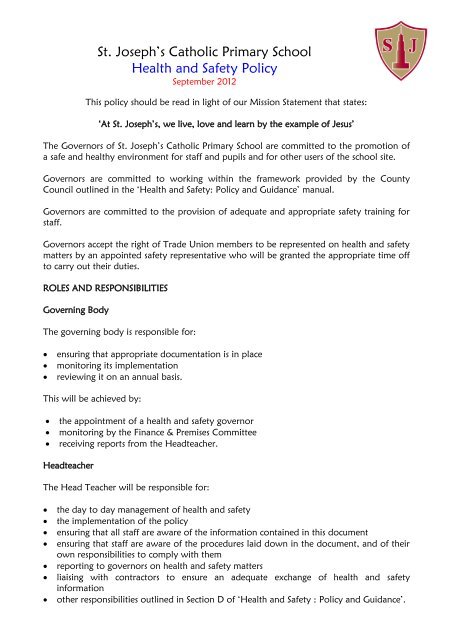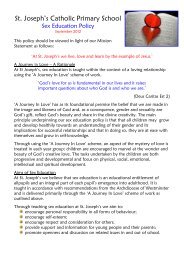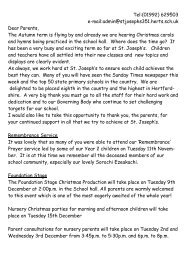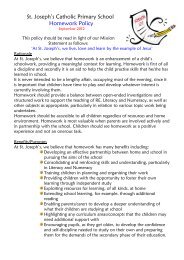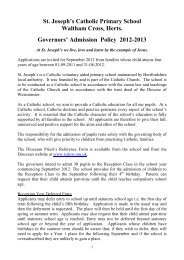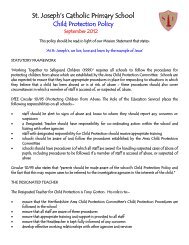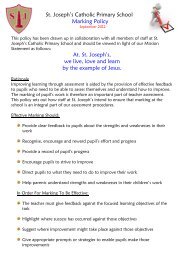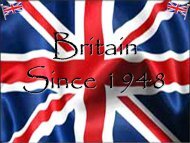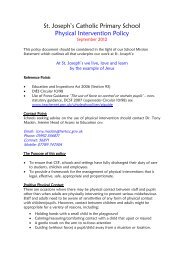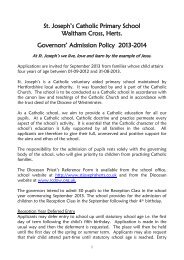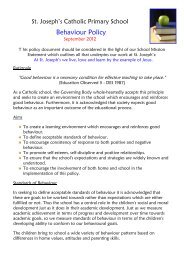HEALTH AND SAFETY POLICY - St. Joseph's Catholic Primary School
HEALTH AND SAFETY POLICY - St. Joseph's Catholic Primary School
HEALTH AND SAFETY POLICY - St. Joseph's Catholic Primary School
You also want an ePaper? Increase the reach of your titles
YUMPU automatically turns print PDFs into web optimized ePapers that Google loves.
<strong>St</strong>. Joseph’s <strong>Catholic</strong> <strong>Primary</strong> <strong>School</strong><br />
Health and Safety Policy<br />
September 2012<br />
This policy should be read in light of our Mission <strong>St</strong>atement that states:<br />
‘At <strong>St</strong>. Joseph’s, we live, love and learn by the example of Jesus’<br />
The Governors of <strong>St</strong>. Joseph’s <strong>Catholic</strong> <strong>Primary</strong> <strong>School</strong> are committed to the promotion of<br />
a safe and healthy environment for staff and pupils and for other users of the school site.<br />
Governors are committed to working within the framework provided by the County<br />
Council outlined in the ‘Health and Safety: Policy and Guidance’ manual.<br />
Governors are committed to the provision of adequate and appropriate safety training for<br />
staff.<br />
Governors accept the right of Trade Union members to be represented on health and safety<br />
matters by an appointed safety representative who will be granted the appropriate time off<br />
to carry out their duties.<br />
ROLES <strong>AND</strong> RESPONSIBILITIES<br />
Governing Body<br />
The governing body is responsible for:<br />
<br />
<br />
<br />
ensuring that appropriate documentation is in place<br />
monitoring its implementation<br />
reviewing it on an annual basis.<br />
This will be achieved by:<br />
<br />
<br />
<br />
the appointment of a health and safety governor<br />
monitoring by the Finance & Premises Committee<br />
receiving reports from the Headteacher.<br />
Headteacher<br />
The Head Teacher will be responsible for:<br />
<br />
<br />
<br />
<br />
<br />
<br />
<br />
the day to day management of health and safety<br />
the implementation of the policy<br />
ensuring that all staff are aware of the information contained in this document<br />
ensuring that staff are aware of the procedures laid down in the document, and of their<br />
own responsibilities to comply with them<br />
reporting to governors on health and safety matters<br />
liaising with contractors to ensure an adequate exchange of health and safety<br />
information<br />
other responsibilities outlined in Section D of ‘Health and Safety : Policy and Guidance’.
Caretaker<br />
The Caretaker will be responsible for:<br />
<br />
<br />
<br />
<br />
ensuring that all defects in the buildings and grounds are notified to the head promptly<br />
undertaking regular checks of the fire alarm system and recording the result in the Fire<br />
Log Book<br />
carrying out regular safety check of the school grounds, including the outdoor play<br />
equipment<br />
any other duties identified by the Head and Governors.<br />
All <strong>St</strong>aff<br />
It is a requirement of the Health and Safety at Work Act that all staff should be familiar with<br />
the health and safety arrangements in place and should comply with them.<br />
All staff will therefore be issued with a copy of this document and will be expected to<br />
comply with the procedures it contains at all times.<br />
All staff have a responsibility towards themselves and others for health and safety and<br />
should report any problems using the procedure outlined in the next section. If necessary<br />
they must be prepared to take appropriate action themselves to remove hazards.<br />
<strong>St</strong>aff should ensure that pupils in their care behave in a safe and proper manner, adhering to<br />
proper safety precautions, particularly in the handling of equipment or materials.<br />
Subject Leaders<br />
Each subject co-ordinator is responsible for ensuring that the storage of curriculum resources<br />
in their subject complies with health and safety guidelines. They should inform all staff of<br />
any potential hazards in the use of equipment or materials.<br />
Other <strong>School</strong> Users<br />
The following users should be made aware of relevant sections of the school’s Health and<br />
Safety Policy:<br />
<strong>School</strong> Secretary<br />
Contractors<br />
Voluntary workers<br />
Parents<br />
Pupils<br />
Other users of the site (hirers).<br />
PRACTICAL ARRANGEMENTS<br />
First Aid<br />
The first aid box/equipment is kept in the school Welfare Room.<br />
All school employees may treat children for minor ailments and accidents. Children may not<br />
give any treatment to other children.
Currently, Mrs Tanyia Quinn and Mr Tony Gorton are fully trained in ‘First Aid At Work’<br />
and Miss Holly Cannon is Pediatric First Aid trained. Mrs Quinn is responsible for ensuring<br />
that all first aid materials are fully stocked and that all Medical Information Forms are<br />
updated on an annual basis. In addition to this, Mrs Quinn also ensures that all children<br />
who use inhalers or have been prescribed an Epipen (or similar) are made known to all staff<br />
who work in the school.<br />
Any member of staff who has attended a recent First Aid course is regarded as a First Aider.<br />
All teachers and the majority of teaching Assistants have attended this course within the last<br />
12 months.<br />
All staff are fully aware that a fully stocked first aid bag must be taken on school outings.<br />
Any inhalers and Epipens for specific children must also be taken.<br />
When children are unwell should report/be taken to the <strong>St</strong>aff Room/<strong>School</strong> Office. A First<br />
Aider will then take responsibility for the child’s welfare.<br />
Accident Recording, Reporting And Investigation<br />
Any accident needing routine treatment in school is deemed a Minor Accident, and should<br />
be recorded in the Minor Accident Book. The person completing the accident record will be<br />
responsible for investigating the causes of the accident and, if necessary, for making<br />
recommendations to prevent recurrence.<br />
If an accident is sufficiently serious that a First Aider is not able to provide routine<br />
treatment, or if a decision has been made for parents to be informed, it is deemed to be a<br />
Serious Accident. All serious accidents will be recorded in the Accident Book kept in the<br />
<strong>School</strong> Office.<br />
As a general rule, the child should not be moved. An adult should stay with the injured<br />
child, and send a sensible child to find a First Aider (see above) to deal with the accident.<br />
All staff who have received first aid training should follow the guidelines provided by <strong>St</strong><br />
John Ambulance.<br />
When a child has injured their head, a Head Injury Form needs to be filled out (and not the<br />
minor accident book). This goes to the class teacher to give to the child’s parents, and the<br />
incident is also recorded in the Accident Log-book in the Welfare Room.<br />
Ice packs should only be used when the injury may cause bruising or swelling. They should<br />
not be placed over an open cut.<br />
Issuing Medicines<br />
<strong>School</strong> staff should not administer any medicines unless the form ‘Issuing medicine to a child<br />
during school time’ has been filled in. As a general rule, medicines issued to children during<br />
school time should be restricted to pupils who suffer from a chronic complaint and could<br />
not otherwise attend school. However, medicines can be given where there is a compelling<br />
need to administer short term medication for a serious complaint.<br />
All first aid waste must be disposed of in the special bin in the Welfare room.<br />
When dealing with an accident, it is not helpful for other children or adults to crowd
ound.<br />
Fire Safety<br />
There will be a termly evacuation practice, the outcome of which will be recorded in the<br />
Fire Log Book. The times of the practices will be varied to cover all times of the school day.<br />
Fire evacuation procedures are displayed in all rooms. All staff must ensure that they are<br />
familiar with them.<br />
The caretaker is responsible for checking the alarm system and recording the result in the<br />
Fire Log Book.<br />
Fire fighting equipment is serviced annually and the date noted in the Fire Log Book.<br />
Combustible items must not be stored in the boiler room. The boiler must be inspected<br />
regularly.<br />
Smoking is not permitted anywhere in the school building.<br />
At large gatherings, for example school plays, all relevant emergency exits must be made<br />
known and be accessible, and a telephone available for emergency calls.<br />
Hazard and Defect Reporting<br />
All defects and hazards relating to the building or grounds should be reported immediately<br />
to the Headteacher.<br />
The Head will be responsible for monitoring the progress on all items reported.<br />
Annual Audits<br />
A safety audit of the school will be carried out each year by the Headteacher, caretaker and<br />
Chair of Finance & Premises Committee.<br />
The outcome and actions taken will subsequently be reported to the Governing Body.<br />
The Annual Health and Safety Audit Report will be returned to CSF’s Health and Safety<br />
Officer by the end of each Spring Term.<br />
Risk Assessment<br />
The results of the audit will help to determine the areas and/or activities for which a formal<br />
Risk Assessment needs to be carried out.<br />
Areas related to teaching and learning will be identified at staff meetings or when new<br />
materials, equipment or procedures are to be used.<br />
The Head will be responsible for allocating the task of undertaking Risk Assessments to the<br />
person best placed to make the assessment.
Control Of Substances Hazardous To Health (COSHH)<br />
The responsibility for carrying out COSHH assessments will rest with the Head, the<br />
caretaker or the secretary, depending on the substance concerned.<br />
COSHH data sheets will be kept in the Headteacher’s office.<br />
Electrical Safety<br />
Any faults must be reported immediately. All appliances must be tested on an annual basis.<br />
Displays or decorations must not be suspended from light fittings.<br />
Only approved contractors will be used in consultation with the authority’s property<br />
services.<br />
Security/Visitors to the Site<br />
During the school day, all visitors will be expected to report to the school office, where<br />
they will be asked to sign the visitors’ book and asked to wear a visitor’s badge.<br />
<strong>St</strong>aff and children are encouraged to challenge politely anyone in school they do not<br />
recognise who is not wearing either a visitor’s or HCC staff badge.<br />
Supervision Before and After <strong>School</strong><br />
The school accepts no responsibility for children who arrive on the premises before 8.30am.<br />
The classroom doors are opened at 8.50am.<br />
Parents are asked to make arrangements to collect their children promptly at the end of the<br />
afternoon session at 3.20pm for infants or 3.30pm for juniors. Infant teachers must ensure<br />
that each child is collected by a known adult. The juniors are told to report to their teacher<br />
or the office if the person who was planned to collect does not arrive. Children are not<br />
allowed to go with another parent unless the child’s parent has been informed. If any child<br />
is not collected straightaway, the class teacher will inform the Headteacher, who will<br />
assume responsibility until the child’s parents/carers take the child.<br />
Cycling To <strong>School</strong><br />
Children are only allowed to cycle to school with their parents, unless they have taken<br />
some form of accredited training.<br />
In each case, if the bicycle is to be left at school, permission must be requested and given.<br />
Dogs on Site<br />
Support dogs (guide dogs, hearing dogs etc) are allowed onto the school site. However,<br />
other dogs are not allowed inside the school grounds, except in special circumstances with<br />
the permission of the Headteacher and Governors.
Use of Car Park<br />
The school car park is for the use of school staff and visitors only. It is not for the use of<br />
parents when bringing children to school or collecting them at the end of the day. Notices<br />
to this effect are placed at the car park entrance to remind parents of the rule.<br />
Pedestrians are not permitted to use the car park as an entrance to or exit route from the<br />
school.<br />
Related Policies<br />
<br />
Managing Medication In <strong>School</strong> Guidelines.<br />
Date of review: July 2013<br />
The policy is also available in the following formats, on request to the Headteacher: email;<br />
enlarged print version; other formats by arrangement.


